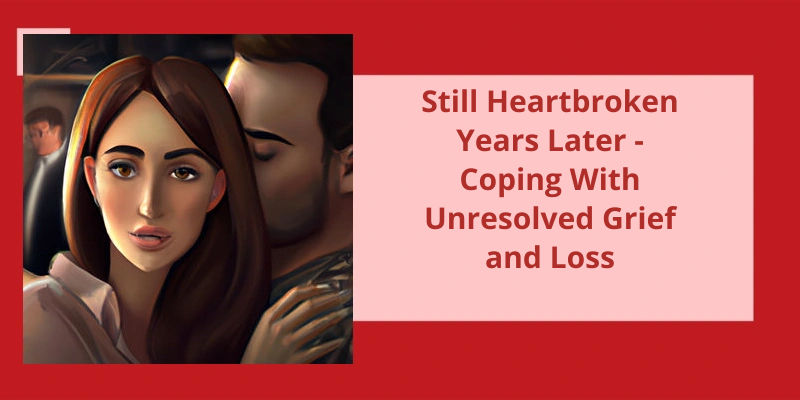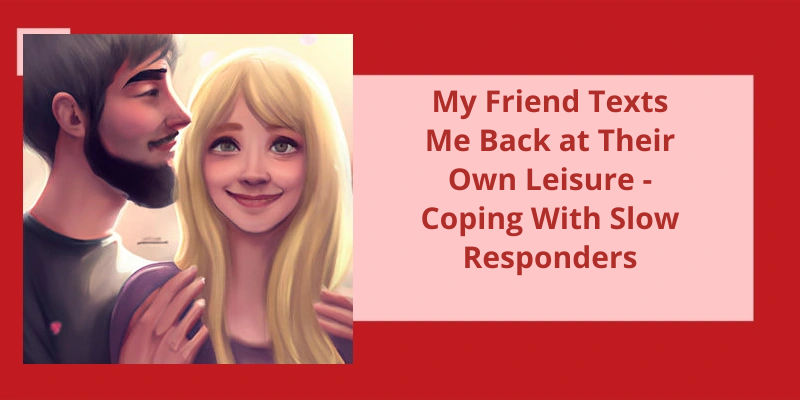It's been years since the end of that relationship, yet those feelings still linger, haunting the mind and heart like a ghost that refuses to let go. Every morning brings another day lived in the shadow of a love that now only exists in memory, a pain that remains fresh no matter how much time has passed. The bereft still wanders through days, searching for something – anything – to fill the void left by that person. It's a lonely journey, one that others may not understand, but it's a struggle that must be endured until the heart finally finds a way to heal. For those who’re still heartbroken years later, the road to recovery is a long and difficult one, but there’s hope that one day, that love will be remembered with fondness rather than pain.
Is It Normal to Still Be Heartbroken After 2 Years?
Heartbreak is a common experience that many people face. It can be caused by a range of events, from the loss of a loved one to the end of a romantic relationship. Everyone heals at their own pace, and there’s no set timeline for moving on from heartbreak. In some cases, it can take years to fully heal and move on from the pain.
If you’re still heartbroken after two years, it’s important to remember that this is perfectly normal. It doesn’t mean that you’re weak or flawed in any way. It simply means that you’re taking your time to heal and process your emotions.
One of the most important things you can do if you’re still heartbroken is to be kind to yourself. Give yourself permission to feel your emotions and acknowledge that they’re valid. Dont beat yourself up for not moving on faster – healing takes time and it’s okay to take as much time as you need.
However, if you’re concerned that your heartbreak is taking too long to heal, it may be time to start taking some more proactive steps. This can include seeking therapy or counseling, joining a support group, or engaging in activities that bring you joy and happiness. These steps can help you process your emotions and move forward in a healthy and productive way.
Tips for Self-Care and Self-Compassion When Dealing With Heartbreak
- Take time to reflect on your emotions.
- Engage in relaxing activities, such as yoga or meditation.
- Reach out to loved ones for support.
- Give yourself permission to feel and express your emotions.
- Practice self-care, such as getting enough sleep and eating well.
- Avoid self-blame or negative self-talk.
- Try journaling to process your feelings.
- Find a therapist or counselor to talk to.
- Take breaks from social media and other triggers.
- Focus on the present moment and practice mindfulness.
- Remember that healing takes time and be patient with yourself.
Recovering from a heartbreak isn’t an easy feat, and it can often feel like a never-ending process. However, it’s possible to heal and move forward with time and effort. Seeking guidance and advice from experts in relationships, like Todd Baratz and Rachel Wright, can also be incredibly helpful. In this article, we’ll delve into their insights on how to fully recover from a broken heart and find love once again.
Do You Ever Fully Get Over a Broken Heart?
According to Baratz, the process of getting over a broken heart involves multiple stages. The first stage he identifies is the initial shock and sadness that comes with the end of a relationship. During this stage, people may experience symptoms like crying, feeling numb, or feeling physically sick. It’s important to acknowledge and process these feelings rather than suppressing them, as this can lead to more prolonged pain in the long run.
The next stage, Baratz says, is anger and frustration. People may start to blame their ex or themselves for the breakup, and this can lead to feelings of resentment and bitterness. However, it’s important to learn to forgive in order to move on. Wright suggests that people practice self-compassion and remind themselves that they did the best they could at the time.
Eventually, people will start to feel less intense emotions and begin to accept the reality of the situation. This is when they can start to work on rebuilding their lives and finding new happiness. Baratz suggests that people engage in self-care during this time, such as exercising, seeing friends and family, or trying new hobbies.
Of course, everyones healing process is different, and there’s no specific timeline for when someone will have fully moved on. It’s important to not compare oneself to others or feel like there’s something wrong with oneself if healing takes longer than expected. Additionally, people may experience triggers or setbacks even after they feel like theyve moved on. This is normal and doesn’t mean they’re back to square one.
It’s possible to fully get over a broken heart and find love again. It takes time, patience, and self-kindness, but with effort and support from others, healing is possible. Wright suggests that people keep an open mind when it comes to new relationships and not let past hurt hold them back from finding new love. Instead, they can use past experiences as lessons and be more mindful in future romantic endeavors.
The Impact of Social Media on the Healing Process After a Breakup
- Increase in exposure to triggering content and reminders of the breakup
- Comparison to other people’s seemingly perfect relationships on social media
- Difficulty in avoiding the ex-partner’s online presence
- Public scrutiny and gossip from others on social media
- Opportunities for social support and connection with others going through similar experiences
- Online resources and communities dedicated to providing support and advice for healing after a breakup
- Increased awareness and understanding of mental health and self-care practices through social media influencers and content creators
- Potential for cyberstalking or harassment by the ex-partner through social media
Heartbreak is a complex emotion that affects different people in different ways. While some may be able to move on quickly from a failed relationship, others may find themselves struggling with the pain and grief for years. It’s important to acknowledge that there’s no right or wrong timeline for healing and everyone’s journey is unique. In this article, we’ll explore the various factors that contribute to the length of heartbreak and provide tips on how to cope with the pain.
Is It Normal for Heartbreak to Last Years?
Heartbreak is a complicated experience, and theres no one-size-fits-all answer to whether it’s normal for heartbreak to last years. It depends on a variety of factors, such as the nature of the ended relationship, the individuals involved, and their ways of coping. This can be a sign that they’re struggling to work through unresolved emotions and come to terms with the end of the relationship.
Factors that contribute to the length of heartbreak can include the intensity of the relationship, the level of attachment or investment, and the reasons for the breakup. For example, if individuals were deeply in love and had a strong bond, their heartbreak may take longer to heal than if they’d a less intense relationship. Similarly, if the breakup was unexpected or particularly hurtful, the grieving process can be more prolonged. In some instances, prolonged heartbreak can be a symptom of depression or other mental health issues, and professional help may be needed to work through the pain.
It’s essential to note that heartbreak isn’t always a linear process. Some days may feel easier than others, and it’s not unusual for grief to come in waves over time. Healing takes time, and it’s essential to be kind to oneself and understand that moving on isn’t a race. It would be best to take the time to process the pain, work through emotions, and focus on personal growth.
Therapy can offer a safe and supportive environment to work through emotions and processes related to the end of a relationship.
Ultimately, there’s no way to know for sure how long heartbreak will last for any given individual. It’s important to remember that healing is possible, even if it feels impossible in the moment. With time, patience, and support, one can work through heartbreak and move forward to a brighter future.
The Physical and Emotional Symptoms of Heartbreak and How to Manage Them
Heartbreak is a painful emotional experience caused by the end of a significant relationship. Symptoms include physical pain, loss of appetite, and emotional distress. It can be managed by engaging in healthy coping mechanisms like exercise, therapy, and spending time with loved ones.
Navigating a breakup can be a difficult and emotional experience that takes time and effort to move past. While you may have moments of doubt and sadness, it’s important to remember that healing is possible and that with patience and self-care, you’ll be able to move on from your heartbreak.
Is It Impossible to Get Over a Heartbreak?
However, the healing process isn’t easy and everyones journey is different. It may take days, weeks, or even months to fully feel like yourself again. It’s important to give yourself time to grieve and process your emotions. Ignoring your feelings can prolong the healing process and may lead to unresolved issues in the future.
It’s also helpful to surround yourself with a support system. Talk to your friends and family about your emotions and let them be there for you. Seek professional help if you need it, such as therapy or counseling. It’s okay to ask for help and support during this difficult time.
One important step in healing from a heartbreak is to avoid contact with your ex. This means deleting their number and social media profiles, as well as avoiding places where you may run into them. The constant reminders of the relationship can hinder your healing and make it harder to move on.
Another helpful step is to focus on self-care. Take time to do things you enjoy and that make you feel good. Exercise, eat healthy, and get enough sleep. Taking care of yourself physically can also improve your emotional well-being.
Remember that healing from a heartbreak is a journey. It’s okay to have setbacks and moments of sadness, but ultimately you’ll come out stronger. Keep moving forward and focus on yourself and your own happiness. Eventually, the pain will fade and you’ll find love and happiness again.
Healing a broken heart after years can be a daunting and challenging task. It’s not something that happens overnight, but rather requires patience, dedication, and a willingness to let go of the past. There are many tips and strategies to help you move on from heartbreak, including taking time to grieve, finding new sources of joy, and acknowledging your thoughts about your former partner. By focusing on self-care, expressing your needs, and turning your attention toward others, you can start to heal and find relief in exercise and movement.
How Do You Heal a Broken Heart After Years?
Healing from a broken heart after years can be a daunting task that requires patience, persistence, and self-love. It’s important to take time to grieve and process the emotions that come with heartbreak. Suppressing emotions and pretending that everything is okay only makes the healing process longer and more painful. Give yourself permission to feel and express your emotions in healthy and non-self-destructive ways.
Find a new source of joy to help fill the void left by the heartbreak. Rediscover hobbies, activities, places, and people that bring happiness and positivity to your life. This can help create new memories and experiences that have nothing to do with your previous relationship.
Making a list of what you like about yourself can help boost self-esteem and confidence that may have been shaken during the breakup. Recognize your strengths, talents, and unique qualities. Appreciating your self-worth can help attract positive and healthy relationships in the future.
Acknowledging thoughts and memories about your former partner doesn’t mean dwelling on past pain and reliving the past. It simply means acknowledging the existence of those thoughts without allowing them to consume your present and future. Writing down those thoughts may also provide clarity and closure.
Expressing your needs and emotions to others can help ease the burden of heartbreak. Reach out to trusted friends, family, or even a therapist for support and guidance. It’s okay to ask for help and it can also strengthen relationships with others.
Turning your attention toward others can also provide a sense of purpose and fulfillment. Volunteering, doing acts of kindness, or helping those in need can create a sense of positive impact and contribution to the world. Focusing on the needs of others can also provide perspective and appreciation for what you’ve in your own life.
Lastly, allowing emotions to flow and finding relief in exercise and movement can be helpful for healing a broken heart. Exercise releases endorphins which can provide a temporary mood boost and can also be a healthy outlet for emotions. Movement such as yoga or dance can also provide a mindful and meditative release of emotions. Taking care of physical health can also benefit emotional health.
Learning to Forgive Yourself and Others Involved in the Heartbreak
- Understand that forgiveness is a process
- Be willing to let go of anger and resentment
- Practice self-compassion and self-care
- Communicate with the person involved in the heartbreak
- Acknowledge your own mistakes and take responsibility for them
- Focus on the present moment and let go of the past
- Seek support from trusted friends or a therapist
- Remember that forgiveness doesn’t mean forgetting or condoning the actions of others
- Be patient with yourself and the forgiveness process
- Celebrate your progress and let go of perfectionism
Conclusion
It’s no secret that heartbreak can be a devastating and long-lasting experience. Despite the passing of time, some individuals may still find themselves grappling with the pain and emptiness caused by a shattered relationship. The reasons for such lingering heartache can vary – perhaps the relationship was particularly deep and meaningful, or maybe the individual hasn’t had the opportunity to properly process their emotions. Whatever the case may be, it’s important to acknowledge that healing is a different journey for everyone and that there’s no set timeline for moving on. Nonetheless, taking steps to nurture oneself and engage in positive activities can be helpful for reclaiming a sense of happiness and fulfillment. In the end, one must remember that there’s always hope for finding love and joy again – for even the most broken of hearts can ultimately be mended.






